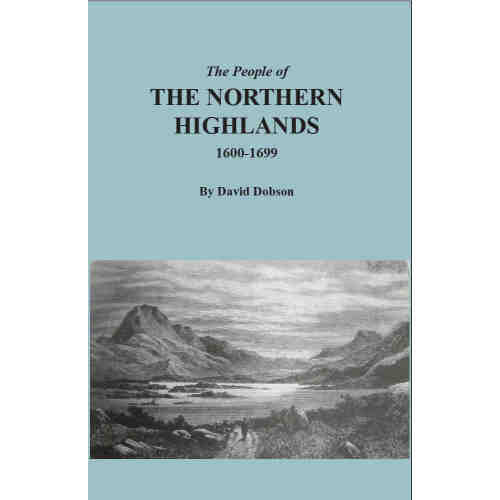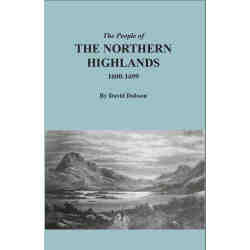This book identifies many of the people of the counties of Caithness, Sutherland, and Inverness-shire during the seventeenth century. The region mostly lies west and north of the Great Glen apart from a portion of Inverness-shire which lies east of Lochs Lochy, Oich, and Ness.
The population was relatively sparse with only a few small burghs mostly lying along the east coast, all of which had medieval origins. The burghs were Dingwall, Tain, Fortrose, Cromarty, Dornoch, Wick, and Inverness, with Scrabster and Thurso by the Pentland Firth, and Kingussie lying within the highlands. The only sizable burgh was Inverness. The people at the time were overwhelmingly Gaelic speakers, with Lowland Scots — who spoke a dialect of English — settled in the burghs. Similarly, placenames were predominantly in Gaelic though a few were based on Norse originals, such as Ullapool, based on Ulapul — Norse for ‘Wolf farm’– or Wick, from Vik the Norse for ‘bay’. Several local surnames superficially in Gaelic include a Norse element, such as McLeod or MacLeoid from the Norse ‘son of Ljotr’, or MacCorquodale based on the Norwegian personal name ‘Thorketill’. There are also a few placenames indicating a Pictish origin, dating before 1000 AD, such as Petty, or Pitcalnie, or Pitkerrie. The Picts inhabited much of Scotland before the early Middle Ages, while the Norse Vikings settled in the Northern Isles, the Hebrides, and what is now Caithness and Sutherland [Suderland in Norse]. In the Medieval period the inhabitants spoke Norn, a Norse dialect, in such localities. However, by the seventeenth century Gaelic and Scots English were predominant. The Reformation of the sixteenth century resulted in Scotland becoming officially a Protestant nation; however, in parts of the Highlands there were Roman Catholic enclaves, notably in Inverness-shire and on Barra.
Migration outwards from the Northern Highlands was initially small scale, apart from mercenaries who were recruited to fight for Scandinavia and the Netherlands, many of whom settled there. The Wars of the Three Kingdoms, 1638-1651, led to enforced emigration or the transportation of prisoners of war, most of whom were captured at the Battle of Dunbar in 1650 or the Siege of Worcester in 1651. These men were banished to the English colonies in the Caribbean, notably Barbados, or to Virginia and New England; they can be identified by their distinctive local surnames. Large-scale emigration from the Northern Highlands began in the eighteenth century and especially after the Highland Clearances of the mid-nineteenth century. The main clans or families during the seventeenth century were Sinclairs, Mackays, Sutherlands, McLeods, Rosses, Stewarts, McKenzies, Munros, Urquharts, Frasers, McDonnells, Chisholms, MacPhersons, McGillivrays, Davidsons, Gunns, McKinnons, MacDonalds, McLeans, Camerons, and Roses.


